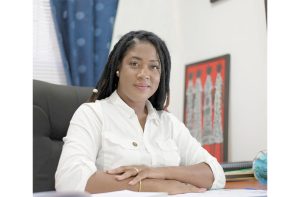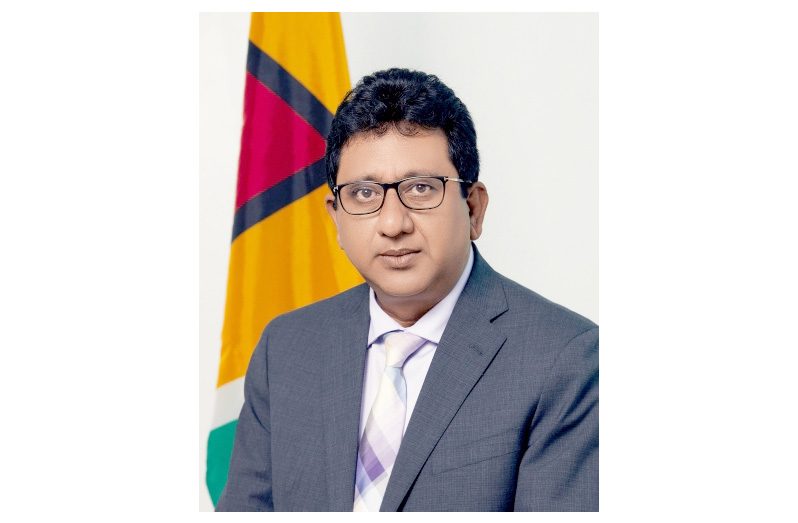–assures case will not halt September 1 polls
ATTORNEY-GENERAL and Legal Affairs Minister Anil Nandlall, SC, has sharply criticised the legal challenge mounted by the Forward Guyana Movement (FGM) against the Guyana Elections Commission (GECOM).
He described the case as “absolutely without merit” and a “colossal waste of the court’s time.”
Commenting on the case on Friday, just days ahead of the September 1 General and Regional Elections, Nandlall emphasised that the application filed by FGM, led by attorney Amanza Walton-Desir, reflects a fundamental misunderstanding of Guyana’s electoral system.
Nandlall while criticising the case, highlighted the irony that the party’s leader is an attorney by profession yet appears to have a fundamental misunderstanding of Guyana’s electoral laws.
“This case, in my view, is a demonstrable illustration of a major lack of understanding of our electoral framework as established by the Constitution of Guyana, and the electoral machinery as established by the relevant statutory provisions. This case should never have been filed,” the AG stated.
He added: “The case has absolutely no merit, it has no likelihood of success and would amount to a colossal waste of the court’s time.”
Nandlall added that the timing of the action, coming less than two weeks before the September 1 General and Regional Elections, compounded its disruptive effect.
“Hopefully, at the end of the matter, the court will express its displeasure at its process being abused and impose an appropriate order in relation to legal costs, not only because of the flagrant lack of merit, but also because a tremendous number of resources, time, and energy that have to be expended at this crucial time—days before the election—on a hopeless legal challenge,” he declared.
Nandlall said the court has a duty to safeguard its own processes from being used frivolously.
“Litigants who invoke the processes of the court at such an unfortunate time, and who cause the wastage of a massive number of resources, should feel the wrath of the court, and the court has an obligation to express its discontent with actions that are so patently frivolous and vexatious,” he said.
On Wednesday, FGM candidate Krystal Hadassah moved to the High Court seeking to block the elections unless GECOM includes the party’s list of candidates on the ballots in all 10 electoral regions.

Through attorney Dr. Vivian Williams, Hadassah is asking the court to declare that GECOM’s current practice—excluding parties from ballots in regions where they are not contesting Regional Democratic Council (RDC) seats—violates constitutional guarantees of equal suffrage and representative democracy.
FGM maintains that GECOM’s refusal to include its candidates on ballots in regions Seven, Eight, and Nine denies its constitutional right to contest free and fair elections and restricts voters’ right to choose.
The party argued that the system disadvantages smaller and emerging political movements, distorting proportional representation and undermining inclusionary democracy.
It is seeking multiple declarations against GECOM, including that its exclusion is discriminatory, unconstitutional, and invalidates the elections if not corrected.
The party further argued that the system discriminates against voters in regions where their preferred party does not appear on the ballot, citing Articles 59, 149, and 13 of the Constitution of Guyana.
FGM is also seeking a ruling that any elections conducted without its inclusion on every regional ballot would be “null, void, and of no legal effect.”
FGM is a coalition made up of Forward Guyana (FG), The People’s Movement (TPM), and the Vigilant Political Action Committee (V-PAC).
PROPORTIONAL REPRESENTATION SYSTEM
In rebutting the claim, Nandlall outlined the mechanics of Guyana’s proportional representation system, which he stressed are clearly defined in Article 160 of the Constitution, the Representation of the People Act, and the National Registration Act.
Nandlall explained that Guyana operates under a proportional representation system established by Article 160 of the Constitution, which governs elections to both the National Assembly and the Regional Democratic Councils.
He noted that each general election is essentially two elections held simultaneously—one to elect 65 members of Parliament and another to elect members of the Regional Democratic Councils. This structure, he pointed out, is the reason voters are required to cast two votes during General and Regional Elections.
He emphasised that the country is divided into 10 geographic constituencies, corresponding to the administrative regions.
Of the 65 parliamentary seats, he said that 25 come directly from those geographic constituencies while the remaining 40 are drawn from a national “top-up” list.
“So, each party has to submit three lists. One for the geographic 25 seats and one for the national top-up list,” Nandlall said.
He added: “When you vote, you are voting for the geographic seat and that vote is also counted for the national top-up. The two are inextricably bound. The Representation of the People Act says that in order to contest the elections, you have to contest a minimum of six of the RDC seats and at least 13 of the geographic seats.”
According to him, the FGM’s contention that it must appear on ballots in all 10 regions for national representation is legally baseless.
FGM has already indicated its intention to take the case all the way to the Trinidad-based Caribbean Court of Justice (CCJ)—the highest appellate court for Guyana.
In response to this, the Attorney General said: “This case is a clamor for attention. It is a shameless stunt for publicity. Maybe the presidential candidate will change her mind after the decision of the High Court. If there is a desire to appeal, that is a right—everyone is entitled to pursue his/her rights to the very end. I will not stand in the way of that.
“I just want to assure the general public that the exercise of that right to appeal will not affect the September 1 election.”
Nandlall noted that recent amendments to the electoral laws were designed to strengthen the electoral system by removing the excessive discretion previously held by officers, a discretion that had been abused as was evident during the 2020 elections.
He added that the changes also establish new election-related offences, and provide for harsher penalties for violations.
In reflecting on the lessons from the widely criticised 2020 elections, Nandlall emphasised the measures taken to prevent a repeat of past irregularities.
He highlighted that the system has been made more efficient, robust, transparent, and accountable, making it significantly harder for anyone to replicate the electoral manipulation seen five years ago.
However, he warned that those determined to undermine the process are resourceful and adaptive, and may still attempt to devise new schemes.
Nandlall said: “We have done a lot to make the system more efficient, more robust, more transparent, and more accountable. It would be difficult for anyone to repeat what transpired in the 2020 elections. But the electoral miscreants are flexible and skillful, so no doubt they will hatch new tricks.”



.jpg)









